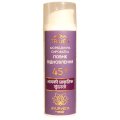 An age-related decrease in the production of collagen is considered one of the main causes of skin ageing. A lack of collagen in the skin causes it to lose elasticity and results in the formation of wrinkles. Because of this, various cosmetic brands offer an impressive selection of skincare products with hydrolysed collagen. But do these products really help to slow down skin ageing? Let’s take a closer look at the main myths and facts about collagen in skincare products.
An age-related decrease in the production of collagen is considered one of the main causes of skin ageing. A lack of collagen in the skin causes it to lose elasticity and results in the formation of wrinkles. Because of this, various cosmetic brands offer an impressive selection of skincare products with hydrolysed collagen. But do these products really help to slow down skin ageing? Let’s take a closer look at the main myths and facts about collagen in skincare products.
Interest in collagen as a cosmetic ingredient arose back in the 1930s ans has not subsided ever since. At first, collagen was derived from cattle skin, cartilage and bones; later it was discovered that marine fish is a good source of collagen, too. You may have also come across mentions of plant-based collagen or vegetable collagen, which is allegedly derived from wheat and other plants, but this is just the first popular myth about collagen.
The fact is, collagen is an animal protein. It is mostly found in connective tissue of all animals (which, by the way includes humans): bones, cartilage, ligaments, skin, and tendons. Plants, fungi and bacteria do not contain any collagen. Therefore, what is referred to as plant-based collagen is in fact vegetable protein that somewhat resembles collagen in structure and effect on the skin, but is not identical to it.
Wheat, soy, and other plant proteins are effective cosmetic ingredients that are found in many skin and hair care products; they are the next best thing for vegans, who can’t use products with collagen because it’s animal-derived. But a fact is a fact, the so-called plant-based collagen is not collagen.
Another popular myth about collagen in cosmetics says that collagen is able to penetrate deep into the skin structure an act “at the molecular level”. Alas, no matter how much we wish it had such an effect, the mass and size of collagen molecules do not allow them to penetrate into the dermis or stimulate the production of the skin’s own collagen.
The synthesis of collagen in the human body is a natural process that mostly occurs in specialised cells called fibroblasts. Fibroblasts are located deep in the structure of the skin, and collagen molecules are too large to get to them. Even hydrolysed collagen, which has lower molecular weight, cannot affect the functioning of fibroblasts.
But if collagen cannot stimulate fibroblasts and therefore boost the production of the skin’s own collagen, is there anything that can do this? As a matter of facts, there is. Certain bioactive substances has a similar effect to the epidermal growth factor. They include low molecular weight hyaluronic acid, retinol (vitamin A), niacinamide (vitamin B3), and ascorbic acid (vitamin C).
The third common myth about collagen is associated with the idea that collagen affects the skin instantly, restoring its natural beauty, firmness and smoothness in the blink of an eye. Unfortunately, this is not the case. There are collagen-based cosmetic products that promise an instant effect, but their effect is superficial and very short-lived. You can use them to give your skin a boost before an important event, but that’s it.
These myths and facts about collagen illustrate that a lot of people have misconceptions about this cosmetic ingredient, and so skincare products with collagen fail to meet their expectations; not because they’re bad, but because the expectations were unrealistic in the first place. This is why it is very important to know what collagen is really capable of:
- it can create a moisture-retaining barrier on the surface of the skin that will keep the skin hydrated, soft and smooth while letting it breathe;
- it can enhance and prolong the effect of other active ingredients in cosmetic products, such as natural oils and extracts;
- it can stimulate regeneration, speeding up the healing of damaged skin.
When it comes to slowing down skin ageing and reducing the signs of ageing, one cannot count on collagen alone. It is recommended to opt for anti-age products where collagen is combined with ingredients that can stimulate collagen production in the skin, such as vitamins A, B3 and C, hyaluronic acid, natural carrier oils, vegetable proteins, peptides, alpha- and beta-hydroxy acids.
In our online shop Organic Store, you will find natural and organic anti-age products produced by trustworthy brands, where anti-age ingredients have been carefully selected and combined to produce a visible effect as soon as possible. At Organic Store, we offer affordable prices, convenient and secure payment methods, quick order processing, and international delivery to most part of the world.
Anti-Age Skincare Products in Our Store
Triuga Ayurveda Mix Full Recovery Face Serum 45+, 50 ml |
